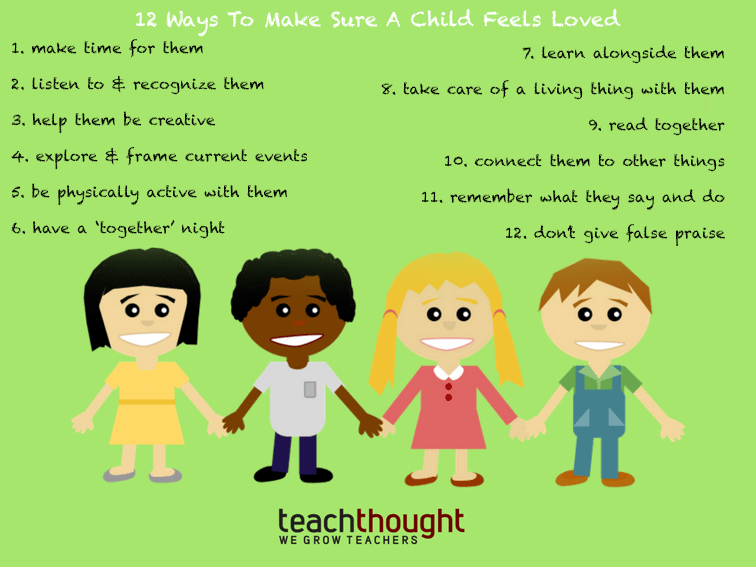
How To Make Sure A Child Feels Loved
by Laura LeMaster
Did you know the first Saturday of April was Love Our Children Day?
Showing love to our students and children is vital to growing and impacting their young minds.
According to Love Our Children USA, every year over three million children are victims of violence and neglect. Our society seemingly focuses less on the importance of simply showing love and more on the expectations children are “supposed to have”. This special day lets love on our kids a little extra, raise awareness for those in need, and be reminded of the fact that this should be a part our everyday lives and not just on a specific day.
See also 25 Things Successful Teachers Do Differently
In honor of the children and this day, here are 10 ways to show some extra care.
12 Ways To Make Sure A Child Feels Loved
1. Make specific and intentional time for them
And don’t miss it.
Whether you have one or multiple kids, make time to spend with them one-on-one. “Getting to know them” sounds absurd, but it’s actually incredibly important. Learn about them. Build a bond specific between the two of you. Go places and do things that are different; go outside of your normal ice cream shop or family spot.
2. Listen to and recognize them
See #1.
And ‘listening’ isn’t simply hearing, but also involves understanding, caring, and ‘getting’ a child–who they are, where they are coming from, and what they might need and hope for from you. There are many things you can say to encourage a child, but listening may be even more important.
Listening to and recognizing a child can’t be saved for special events or ceremonies, nor does it always have to be praise and acclaim. The simple act of persistent interaction, by seeing and hearing, lets them know they are–well, seen and heard. Y
You’d be surprised how many students don’t consistently feel this and will respond by seeking the wrong kind of attention.
3. Help them be creative
Make a craft together. Play with Legos. Get outside. Make up a new game. Paint. Play Minecraft. Build a maker kit. Write a song or a play.
There are endless possibilities, especially if you allow them to lead with their own ideas.
4. Explore (and frame) current events
Helping a child both become aware of what’s going on in the world and make sense of it in a healthy and critically-literate way can be among the most important lessons you ever teach them.
Help them understand what’s going on and have a conversation not just on the facts, but about what they think and believe while helping them see all of the possible ways of ‘framing’ these events, and maybe even make it metacognitive–help them see their own thinking, and where those ideas come from.
Whether from news, political, human, data, or any other possible perspective, the reality that how you see the world determines what you see and how you think about it is more crucial than knowing the events themselves.
5. Be physically active with them
Be physically active alongside them.
Exercise is one way, and has countless benefits for you and growing children, physically, psychologically, and more. physical activity is one of the best, easiest (and free) things to do that’s usually more fun with someone else.
Not only is the act of exercise beneficial, but teaching kids about it can impact them in a much more positive way than you can imagine.
6. Have a ‘together’ night
Joining the family together (or another special group) is something that seems to be a lost value in today’s society. Bringing everyone together to play charades, board games, team-building games, discuss current events, or simply have dinner at the table will be something all of you cherish.
Cooking with them–or better yet, gardening food that you then prepare, cook, and eat together–sends signals to a child that they are safe, cared for, and learning life skills that transcend formal education.
7. Take time to learn with them
Instead of “what did you do in school today,’ use these alternatives; get to the heart of what they’re learning and what they’re absorbing.
8. Take care of another living thing together
Whether it be your pet or a houseplant, teach them the importance of caring for others by using the living animals and creation around us.
9. Read together
Whether you read to them, with them, or listen to them read, literacy is a common bond that brings people together.
Inspire children by modeling a love for books, writing, and even drama, art, and related ‘humanities.’ Books that teach children empathy are just one example. They can take you to different lands–even books that can make you happy, or educate. There are so many possibilities and ways to use them, but the broadest message is that you care about them and that they are safe and loved.
10. Connect them with other ‘things’ that can ‘love’ them
Whether friends, books, projects, local communities, groups, teams, extracurricular clubs, or any other group, the feeling of acceptance and belonging can help a child feel loved and part of something that gives them a sense of purpose that they can then craft and make all their own.
11. Remember something they said or did
12. Don’t give false praise, but rather thoughtful and authentic recognition
12 Ways To Make Sure A Child Feels Loved

